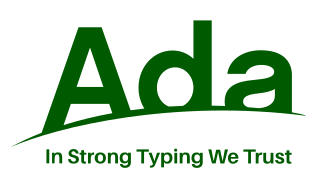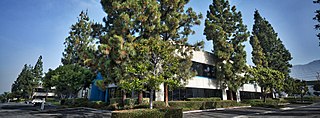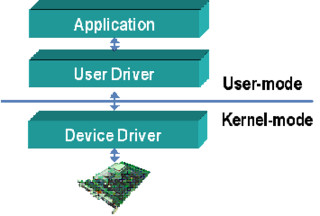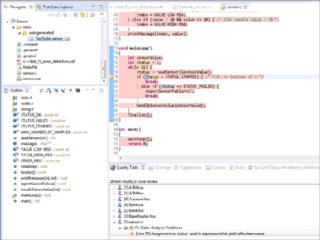Related Research Articles

Ada is a structured, statically typed, imperative, and object-oriented high-level programming language, inspired by Pascal and other languages. It has built-in language support for design by contract (DbC), extremely strong typing, explicit concurrency, tasks, synchronous message passing, protected objects, and non-determinism. Ada improves code safety and maintainability by using the compiler to find errors in favor of runtime errors. Ada is an international technical standard, jointly defined by the International Organization for Standardization (ISO), and the International Electrotechnical Commission (IEC). As of May 2023, the standard, called Ada 2022 informally, is ISO/IEC 8652:2023.
In computer science, static program analysis is the analysis of computer programs performed without executing them, in contrast with dynamic program analysis, which is performed on programs during their execution in the integrated environment.
In computer science, program analysis is the process of automatically analyzing the behavior of computer programs regarding a property such as correctness, robustness, safety and liveness. Program analysis focuses on two major areas: program optimization and program correctness. The first focuses on improving the program’s performance while reducing the resource usage while the latter focuses on ensuring that the program does what it is supposed to do.
In the context of hardware and software systems, formal verification is the act of proving or disproving the correctness of a system with respect to a certain formal specification or property, using formal methods of mathematics. Formal verification is a key incentive for formal specification of systems, and is at the core of formal methods. It represents an important dimension of analysis and verification in electronic design automation and is one approach to software verification. The use of formal verification enables the highest Evaluation Assurance Level (EAL7) in the framework of common criteria for computer security certification.

Code review is a software quality assurance activity in which one or more people examine the source code of a computer program, either after implementation or during the development process. The persons performing the checking, excluding the author, are called "reviewers". At least one reviewer must not be the code's author.
Dynamic program analysis is the act of analyzing software that involves executing a program – as opposed to static program analysis, which does not execute it.
The SofCheck Inspector is a static analysis tool for Java and Ada. It statically determines and documents the pre- and postconditions of Java methods or Ada subprograms, and uses that information to identify logic flaws, race conditions, and redundant code in an individual Java class or Ada package, a subsystem, or a complete program. The SofCheck Inspector is produced by SofCheck, Inc., a software product company in Burlington, Massachusetts.

Parasoft is an independent software vendor specializing in automated software testing and application security with headquarters in Monrovia, California. It was founded in 1987 by four graduates of the California Institute of Technology who planned to commercialize the parallel computing software tools they had been working on for the Caltech Cosmic Cube, which was the first working hypercube computer built.
In engineering, debugging is the process of finding the root cause, workarounds and possible fixes for bugs.
Polyspace is a static code analysis tool for large-scale analysis by abstract interpretation to detect, or prove the absence of, certain run-time errors in source code for the C, C++, and Ada programming languages. The tool also checks source code for adherence to appropriate code standards.
Cppcheck is a static code analysis tool for the C and C++ programming languages. It is a versatile tool that can check non-standard code. The creator and lead developer is Daniel Marjamäki.

Device drivers are programs which allow software or higher-level computer programs to interact with a hardware device. These software components act as a link between the devices and the operating systems, communicating with each of these systems and executing commands. They provide an abstraction layer for the software above and also mediate the communication between the operating system kernel and the devices below.
Astrée is a static analyzer based on abstract interpretation. It analyzes programs written in the programming languages C and C++, and emits an exhaustive list of possible runtime errors and assertion violations. The defect classes covered include divisions by zero, buffer overflows, dereferences of null or dangling pointers, data races, deadlocks, etc. Astrée includes a static taint checker and helps finding cybersecurity vulnerabilities, such as Spectre. It is proprietary software written in the language OCaml.

Parasoft C/C++test is an integrated set of tools for testing C and C++ source code that software developers use to analyze, test, find defects, and measure the quality and security of their applications. It supports software development practices that are part of development testing, including static code analysis, dynamic code analysis, unit test case generation and execution, code coverage analysis, regression testing, runtime error detection, requirements traceability, and code review. It's a commercial tool that supports operation on Linux, Windows, and Solaris platforms as well as support for on-target embedded testing and cross compilers.
AbsInt is a software-development tools vendor based in Saarbrücken, Germany. The company was founded in 1998 as a technology spin-off from the Department of Programming Languages and Compiler Construction of Prof. Reinhard Wilhelm at Saarland University. AbsInt specializes in software-verification tools based on abstract interpretation. Its tools are used worldwide by Fortune 500 companies, educational institutions, government agencies and startups.
ECLAIR is a commercial static code analysis tool developed by BUGSENG, LLC for automatic analysis, verification, testing and transformation of C and C++ programs.
In computer science, language-based security (LBS) is a set of techniques that may be used to strengthen the security of applications on a high level by using the properties of programming languages. LBS is considered to enforce computer security on an application-level, making it possible to prevent vulnerabilities which traditional operating system security is unable to handle.
Infer, sometimes referred to as "Facebook Infer", is a static code analysis tool developed by an engineering team at Facebook along with open-source contributors. It provides support for Java, C, C++, and Objective-C, and is deployed at Facebook in the analysis of its Android and iOS apps.
References
- ↑ Cole, Bernard. "AdaCore releases new CodePeer static analysis tool". Embedded. Retrieved 17 June 2014.
- ↑ Boulanger, Jean-Louis (November 2011). CodePeer – Beyond Bug-finding with Static Analysis (Static Analysis of Software: The Abstract Interpretation ed.). Hoboken, NJ, USA.: Wiley. p. 183. ISBN 978-1-84821-320-3.
- ↑ Taft, Tucker (May 2015). "Re-Engineering Abstract Interpretation". HCSS Conference. Retrieved 4 June 2015.
- ↑ Ayre, Jamie (October 2014). "AdaCore's CodePeer Static Analysis Tool Earns Qualification for Software Verification in Avionics, Railway" . Retrieved 4 June 2015.
- ↑ Walsh, Trudy. "CodePeer spots Ada code errors early". GCN. Retrieved 17 June 2014.